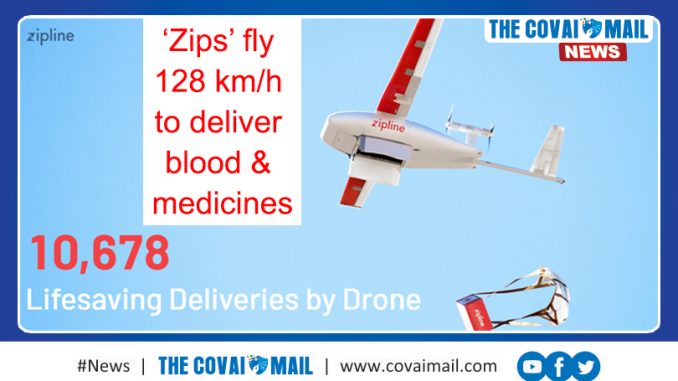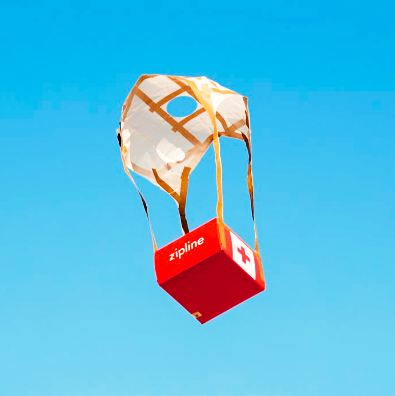
The drone technology which came into legal commercial existence in 2014 and mostly used for aerial photography, is now serving many purposes. The Covai Mail , after recently covering the drone called ‘Flying Farmer’ which is used for agricultural purposes, is now glad to bring to you about drones called simply as ‘Zips’- one of the many drones that deliver emergency medic-kits in places that are inaccessible and need instant medical help.

Zips are built by an American startup called Zipline International. This company is headquartered in California. Three Harvard University scholars: Keller Rinaudo, Keenan Wyrobek and William Hetzler, who after their graduation were interested in Robotics shifted their attention to serve a higher purpose. At first the trio focused on producing mini-robots but soon Keller Rinaudo (who is now the CEO of Zipline) wanted their inventions and business to create a social-change and that is how they founded Zipline.
The company began its operations in 2014. The Zips are designed in Half Moon Bay, California which is their Head Quarters; assembled at South San Francisco and completely tested for their functionality and ability at the HQ California. In today’s world, when a patient is in need of a blood donation and when there is no one to donate nearby, what can be done? We post help as our Whatsapp Status, use social media apart from other traditional methods. But in the African countries such as Rwanda and Ghana, the people need not stress much.
Zipline International serves these two countries in terms of delivering bloods & medicines via their Zips. When a doctor (in the said two countries) sends a request for medicines or blood to the company via sms, whatsapp or through the company’s website, the requested content is loaded in one of their drones from the base.

After proper packaging, the drone takes flight. It is sent to the sky via a rail that uses a pulley and an electric motor to take off. This gives the needed boost and the drone zooms into the sky. It travels at a whooping max speed of 128 km/hr and reaches any destination within these two countries in just 30 mins.
The drones are well-coordinated via GPS and dedicated 3-D mapping technology to avoid clashing in hills and rocks. Prior to their journey, the base contacts the country’s chief air-traffic control so that the drones are given proper clearance.
The drone is electric and doesn’t pollute the atmosphere. It can carry up to 1.75 kgs of contents in it. It is operated from the base and once it reaches the destination, the drone comes to a lower altitude and it just sends out the medi-kit down from the sky and through a small and effective parachute, the contents reach the hospital.
A camera observes whether the chosen drop-point is okay for sending out the contents and only when the controller at the base approves, the package is sent down. Per day thousands of medical deliveries are made by the drones which are immediately prepared for their next flight. The drones never land anywhere except for their base. So far more than 10,500 deliveries have been made and it is still going high.

Each drone is designed to be highly durable and it is capable of withstanding rain, sunshine and turbulent weather. The innovative brains behind this project have taken all precautionary measures to ensure that the emergency medicines are properly delivered via their drones.
But you may ask, what if the mechanism/engine/navigation and power stops or malfunctions? The founders have a fantastic team of experts have built two motors and two of navigation and power systems inside the Zips so that if one fails, the second one will immediately start to be of service. Simply brilliant isn’t it!
The company has taken all possible measures to make the Zips help the people. At present Ghana and Rwanda are the places where the company serves but if every nation requests, would the benevolent hearts behind Zipline say no?
Innovations are meaningless if they fail to serve the people in need and right now the company is doing its best. It is time that we and the rest of the world start sponsoring projects such as these and bring these to our nations where several people are in certain need of assistance such as these.
Those places that are impossible for a vehicle to reach, Zipline can reach in record time. The project’s major funders are Jerry Yang, Co-Founder, Yahoo; Paul Allen, Co-Founder, Microsoft and Google Ventures.
If India could get such a service, imagine the number of lives that could be saved! There are people who use technology for good and we feel really happy to bring the good work done by Zipline to your eyes.
